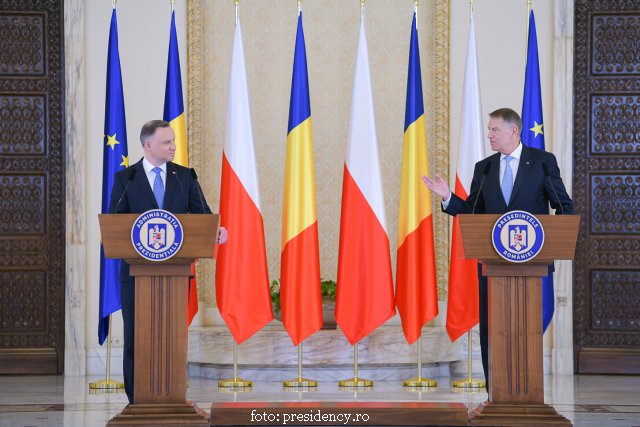Romania, Poland and NATO’s eastern flank
Romania and Poland want additional NATO troops to be deployed on the Alliance's eastern flank

Mihai Pelin, 23.03.2022, 14:00
Started nearly a month ago, Russia’s invasion of Ukraine continues.
Several strategic cities are bombed and attacked, while people are fleeing the
war-torn former Soviet republic. In this context, the presidents of Romania and
Poland, Klaus Iohannis and Andrzej Duda, respectively, have highlighted the
need to strengthen NATO’s eastern flank. The two met in Bucharest on Tuesday,
and agreed the two countries should step up their security cooperation.
President Iohannis argues in favor of an enhanced military presence in Romania
and in the Black Sea region, as a defensive response to Russia’s acts of
aggression.
We urgently need a consolidated, consistent and balanced military
presence on the eastern flank, a forward presence, united and strengthened. The
Alliance needs to boost its military presence in our country and in the Black
Sea region. A clear and necessary step in this respect is the swift creation of
a NATO battlegroup in Romania.
The current developments require a new strategic concept, which should
first and foremost factor in the changes generated by Russia’s invasion of
Ukraine, the Polish president pointed out in turn. President Duda suggested a
permanent defensive presence on the eastern flank, consolidated from the point
of view of military, technology and infrastructure. These are the things needed
right now, in response to Moscow’s actions, the Polish president added. The two
officials also agreed on hosting in Bucharest a NATO B9 summit, two weeks ahead
of the NATO Summit scheduled for July in Madrid. B9 is an initiative launched
in 2015 by the Romanian and Polish presidents, involving the participation of 9
NATO member states on the Alliance’s eastern flank: Bulgaria, the Czech
Republic, Estonia, Latvia, Lithuania, Poland, Romania, Slovakia and Hungary.
The platform is instrumental to expanding dialogue and cooperation between
regional allies, with a view to contributing to the ongoing NATO processes, in
full compliance with the principles of solidarity and undividable security of
all NATO member states. In Bucharest, presidents Iohannis and Duda also tackled
the responsibility of the two EU member states in the region. On this occasion,
Romania’s president reiterated our country’s firm support for the Republic of
Moldova, for its territorial integrity and sovereignty. The impact of the
conflict in Ukraine on Moldova is significant, and the country needs robust,
coordinated, financial and logistic support from the EU and its member states,
that should also cover its energy security, president Klaus Iohannis said. The
two presidents expressed support for the EU integration process of the Republic
of Moldova, Georgia and Ukraine. (VP)






























